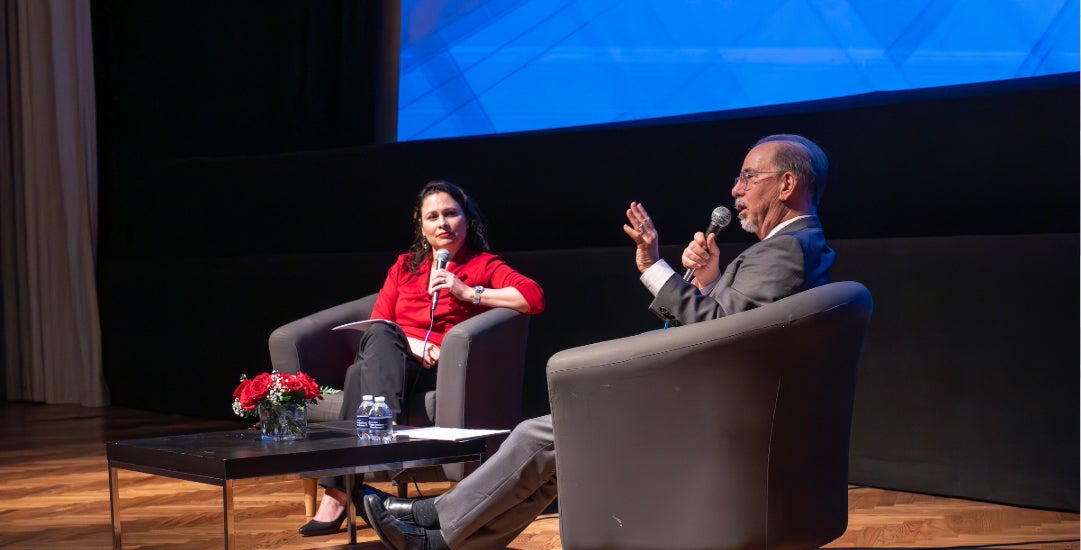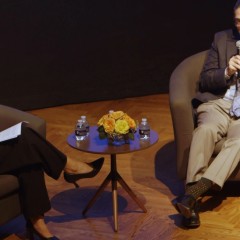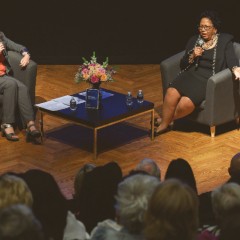Gamoran, the featured speaker at the Kinder Institute Forum on Wednesday at the Museum of Fine Arts, Houston, said the foundation’s primary areas of focus are reducing inequality in youth outcomes and improving the way evidence is used in policy and practice.
“Inequality in the U.S. is excessive,” Gamoran said during his conversation with Kinder Institute for Urban Research Director Ruth N. López Turley. “Inequality is harmful. It is socially divisive, and it’s a drag on our economic productivity. There are steps we can take to reduce inequality. We need research to identify those programs, practices and policies that will in fact reduce it.”
Gamoran has been president of the William T. Grant Foundation, which was established in 1936 and is headquartered in New York City, since 2013. He previously served as the John D. MacArthur Chair in Sociology and Educational Policy Studies at the University of Wisconsin-Madison. His research has focused on educational inequality and school reform.
Education is a key aspect of the foundation’s work, but it also focuses on any part of society that affects young people, such as criminal justice, juvenile justice, housing, child welfare, neighborhoods and after-school programs.
To achieve the mission, Gamoran said it is crucial to produce research that can be applied in a practical manner.
“If we support research, and it gets written up in academic journals and sits on the shelves of libraries, it’s not doing very much to improve the lives of young people,” he said. “How do we make that connection? The answer is the research has to get used. It has to be consequential for decision-makers, it has to change our understanding of our social lives so we can think more deeply about ways to address our problems.”
While it is imperative to conduct cutting-edge research, Gamoran said relationships between producers and consumers of research is most important to ensure its strategic use. One of the leading approaches to building such relationships is through research-practice partnerships.
“In a partnership, there’s an opportunity for researchers to deeply understand the challenges that the practitioner is facing, and therefore to ask questions whose answers matter to decision-makers,” Gamoran said. “Partnerships are the antidote to polarization. If we can build a partnership so we’re not just dropping evidence down from on high, but building relationships with potential actors, there’s a greater chance that the evidence will be used in an authentic way.”
Gamoran acknowledged that universities are being heavily criticized across the spectrum amid the nation’s current political climate. However, they still have a pivotal role to play in supporting and facilitating impactful research. In turn, if universities can do more to serve the public good, they can demonstrate their value more effectively.
“Universities today are beset with challenges from many directions,” Gamoran said. “They’re accused of having political bias, they’re accused of wasting money, they’re accused of not having value for education, they’re accused of not protecting their students. The idea of making universities places where public-impact research is featured more centrally is of interest to every institution.
“Whether it’s an urban private university like Rice, which benefits from demonstrating its value to its community to which it's engaged, or if it’s a public university like the University of Wisconsin, which benefits from showing its value from the state, this kind of public-impact support is very important for universities. We are part of an effort to get universities to seize that moment. They have to recognize the value of partnership-oriented, engaged scholarship.”
Gamoran said universities with high research capacities must place more focus on social sciences and social-impact research as inequality persists.
“Research has a role to play in solving our problems,” Gamoran said. “If we knew what to do, then we wouldn’t need research. We have to be in this for the long term. The moral arc of the universe is long, but it bends towards justice, as Dr. Martin Luther King once told us. But it’s not going to bend towards justice on its own. We have to reach up and grab it with both arms and pull as hard as we can if we want that moral arc to bend towards justice.”



